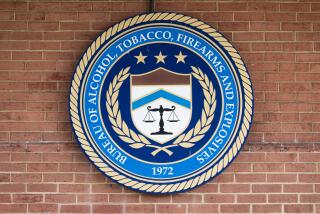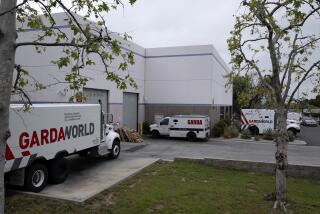Iraqi army officers pulled $4.8-million bank heist, police say
- Share via
BAGHDAD — When thieves shot dead eight guards and made off with $4.8 million in one of Iraq’s biggest-ever bank heists last week, fingers quickly pointed at the Sunni-led insurgency.
Extremists must be turning to crime to finance their activities, so the hypothesis went, and $4.8 million would pay for a lot of bombs.
But after a series of arrests and a sweep of a government compound, Iraqi police say the culprits were Iraqi army officers attached to the elite unit guarding Shiite Vice President Adel Abdul Mehdi.
Four soldiers were in custody Sunday, including a captain and a lieutenant, and the money has been recovered, authorities said. Four other soldiers are still being sought.
Officials have been quick to discount the possibility that Abdul Mehdi, or his powerful political faction, the Supreme Islamic Iraqi Council, were involved.
“They executed the operation for personal reasons, exploiting their profession as officers in the army and their presence in the area,” Interior Ministry spokesman Abdul Kareem Khalaf said during a news conference.
“It had nothing to do with supporting terrorism,” he said.
But the revelations have helped fuel perceptions that the biggest threat to Iraq’s stability these days comes not so much from a greatly weakened insurgency but from within the ranks of its own institutions and political factions.
Iraq’s Shiite-dominated government is notoriously corrupt and inefficient, and though the U.S.-trained security forces are credited with mostly maintaining peace in the month since the American troops finished withdrawing from Iraq’s cities, they too are widely perceived as corrupt. Many Iraqis suspect that much of the low-level violence still prevalent on the streets of Baghdad is being perpetrated by political factions within the coalition government as they jockey for power ahead of January’s national elections.
Even attacks such as Friday’s series of bombings against five Shiite mosques in Baghdad, in which 29 people died, can’t be definitively attributed to the militant group Al Qaeda in Iraq or the remnants of Saddam Hussein’s Baath Party, the usual suspects in bombings, said Nabil Salim of Baghdad University’s Center for International Studies.
“They might do some attacks here and there but you can’t say every attack is Al Qaeda or the Baathists. It isn’t useful,” he said. “There is quite a connection between these attacks and political reasons. Some people inside the system don’t want stability in the Iraqi state.”
Those suspicions were echoed last week by a senior U.S. military advisor who circulated a memo among news organizations in which he argued that American troops were serving no useful purpose in Iraq.
“There is no longer any coherent insurgency,” wrote Col. Timothy R. Reese, chief of the Baghdad Operations Command Advisory Team. Rather, he said, violent attacks are being carried out by political factions with the goal of “affecting their political standing within the existing power structures of Iraq.”
Continued violence harms the reputation of Prime Minister Nouri Maliki, whose popularity soared after he oversaw sharp declines in attacks over the last two years, but who is now struggling to improve services and bolster the economy ahead of the elections.
With most of Iraq calmer than at any point since the 2003 U.S.-led invasion, it is no longer possible to blame poor services strictly on insurgent attacks. This summer, electricity supplies are down sharply, with some neighborhoods receiving only two to four hours of power a day, while many areas are going without running water for days at a time.
In a speech to tribal leaders Saturday, a visibly frustrated Maliki accused factions within his government of holding up reconstruction projects in order to dent his popularity ahead of the elections.
“Some are obstructing the release of allocations for electricity projects so that people can’t say the Maliki government improved the power supply,” he said. “Stop this project, prevent this bill. A project goes to parliament, but it is never voted upon. Why? So that people can’t say Maliki accomplished anything.”
The Sunni insurgency is still active in the northern city of Mosul, and a series of recent bombings in Al Qaeda in Iraq’s former stronghold of the western province of Anbar has given rise to fears that the group is reviving there. In the latest attack Sunday, five people died in a bombing at a market in the town of Haditha.
At least the Iraqi government was able to swiftly solve the bank robbery -- at first believed to involve nearly $7 million -- and expose the suspects, said Sami Askari, a Shiite legislator who is close to Maliki. So sensitive was the discovery that elite Iraqi troops were involved, the Interior Ministry first approached Maliki and asked him what to do. Maliki gave the go-ahead to arrest all the suspects, Askari said.
“It was a genuine test of the prime minister, the Interior Ministry and all of us in the event we face such problems again,” he told Al Hurra TV. “I think we all passed the test.”
--
Times staff writers Raheem Salman and Caesar Ahmed contributed to this report.
More to Read
Sign up for Essential California
The most important California stories and recommendations in your inbox every morning.
You may occasionally receive promotional content from the Los Angeles Times.













